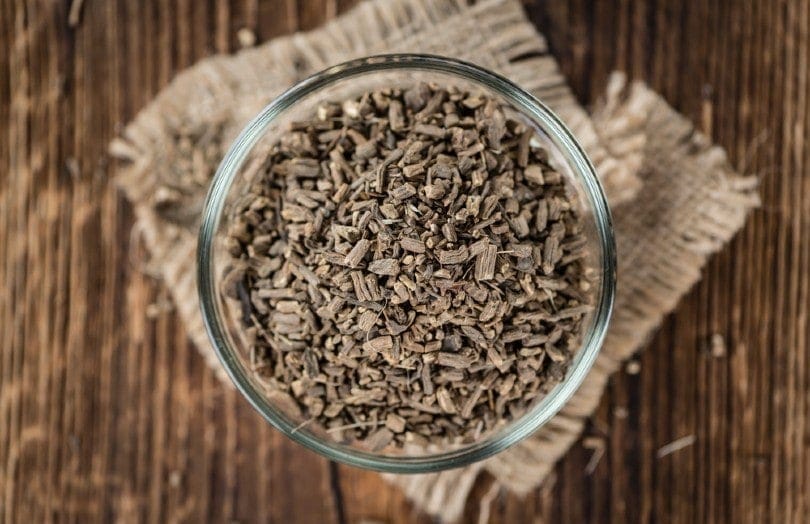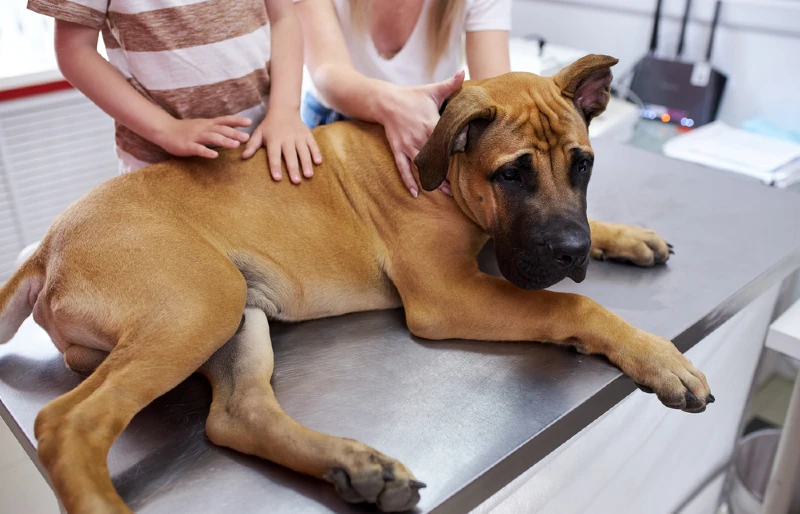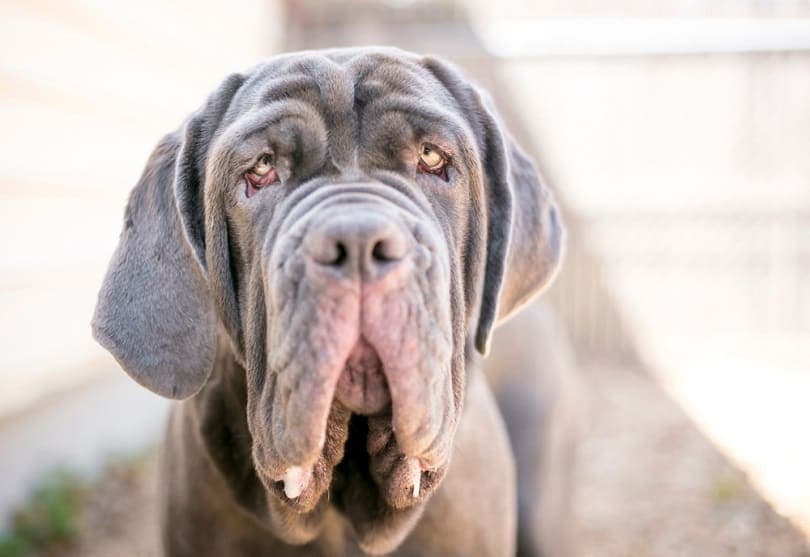Valerian Root for Dogs: Vet Reviewed Dosage, Effectiveness & Uses
Updated on

Click to Skip Ahead
Humans have used valerian root for as long as 2,000 years as a medicinal herb to treat insomnia and anxiety issues. If you’ve been wondering whether or not it could also work for your anxious dog, then you’ll be happy to hear that it can. If your dog freaks out during thunderstorms or when you leave for work, valerian root is a natural remedy that could ease your dog’s anxiety.
However, there are some side effects, and it’s important for you to better understand valerian root before giving it to your dog. So, please read on, and we’ll discuss the various cautions and the recommended dosage for your pup.
What is Valerian Root?
Valerian root is native to Asia and Europe and is currently grown in China, North America, and other various countries. For centuries, the flowers from the valerian plant have been used for perfume and the root for medicinal purposes.
Hippocrates from ancient Greece wrote about the use of valerian root for therapeutic benefits, and Galen of ancient Rome prescribed it for insomnia. The name valerian is a variation of the Latin word valere, which translates to “be well” or “to be strong.”
It can be used in liquid (as a tincture), capsule, and tablet form, as well as consumed as tea. However, if you’re considering introducing valerian root to your dog, you should purchase it in a form that was designed with dogs specifically in mind.

How Does Valerian Root Work?
Valerian root works by increasing the neurotransmitter gamma-aminobutyric acid (GABA) in your brain (neurotransmitter gamma-aminobutyric acid is a fancy scientific word for the amino acids in your brain that work as chemical messengers).
If the GABA in the brain is low, it contributes to higher anxiety and a loss of sleep, so increasing GABA will naturally reduce anxiety and can have a calming effect. It works similarly to a pharmaceutical sedative such as Valium (valerian root has been sometimes called “nature’s valium”) and helps to relieve both psychological and physical stress.
How Does Valerian Root Help Dogs?
There haven’t been any kind of conclusive studies done on the effects of valerian root on dogs, but it is thought that it can have multiple benefits. If your dog is particularly fearful of specific scenarios, such as going to the vet, when you have visitors, or during thunderstorms, it could prove helpful.
It is also known to have some ability to treat seizures. It might also aid your dog before long car rides or before air travel, as well as during the day when he might overreact to separation anxiety. It could help improve your dog’s sleep and may reduce his stress.

Is Valerian Root Safe for Dogs?
If given in small amounts, valerian root should be safe for your dog, but you should always consult with your vet before considering giving your dog any natural remedies. There have been some studies on the effects of valerian root on humans, but there haven’t been many studies done about the safety of the root for dogs.
It is thought to be safe, provided it’s taken with certain safety precautions (which will be discussed below) and in consultation with your vet.
How to Give Valerian Root to Your Dog
If your dog is good at taking pills, they are easy to find online, or your vet might recommend a specific brand you can use. Otherwise, it does come in liquid and powder form, which can be sprinkled on your dog’s food or in his water. According to Veterinary Herbal Medicine, by Susan G. Wynn, DVM, and Barbara Fougere BVSc, the recommended dose of dried valerian root for your dog is between ¼ tsp to 1½ tsp, or for a tincture between 1½ tsp to 3 tsp.
However, no one truly knows what the best dose is for each dog due to the lack of information. The best procedure is to start off with very small doses about 3 or 4 times a day for several days before the stress-inducing event. Again, speak to your vet before dosing your dog because if your dog is on other medications, there is a potential danger for your dog.
There are also products available that are designed to calm dogs that contain valerian root, amongst other ingredients.
Side Effects of Valerian Root
You should watch out for drowsiness and lethargy after giving your dog valerian root, primarily because it treats insomnia, so it does have sedative qualities. Bear in mind that you might also observe your dog exhibiting the opposite effect after being given valerian root. Some dogs have actually become more excitable and skittish after taking this herb.
Other side effects of giving valerian root to dogs could also include dizziness, nausea, vomiting, stomach upset, and low body temperature. Of course, if your dog exhibits any worrying symptoms after being given valerian root, contact your vet immediately.

Cautions
While valerian root for dogs is a natural remedy, it does interact with other medications. You could expect to see more significant side effects if you give your dog valerian root if he is already on an antifungal drug. It is also known to interact with anti-epileptic medication and sedatives, making these drugs more potent. Antihistamines or any mood-altering medications could also interact badly with valerian root.
If your dog is expected to undergo a procedure, valerian root could also interact with anesthetics and, consequently, should not be given to your dog for at least 2 weeks beforehand. It is also recommended to avoid giving valerian root to pregnant or nursing dogs.
Consult Your Vet
Before you even consider purchasing valerian root, the first thing you must do is discuss it with your vet. You need to be sure that your dog is not on any medications that will adversely interact with valerian root, and your vet can also help you figure out the right dose for your dog.
If your dog has serious anxiety issues, you might need to use regular medication prescribed by your vet rather than just relying on valerian root. Likewise, if your dog suffers from seizures, you should absolutely not rely solely on valerian root.
Overall, valerian root should never be relied on for long periods of time. It’s essential to always look for the cause of the problem instead of just treating it. For example, if your dog gets stressed over thunderstorms, there are other methods you can try out (weighted vests, soundproofing his kennel, etc.) instead of only dosing your dog with valerian root.

Conclusion
Valerian root for dogs can be safe and work quite well but remember, what works successfully for one dog will not necessarily work for another. If your dog is on any medication, remember to speak to your vet first and try to aim for a lower dose of valerian root to start.
The lack of studies done regarding valerian root and dogs means that there is no guarantee that it is actually safe for your particular dog or that it will work. Therefore, we cannot stress enough how important it is to speak to your veterinarian before purchasing or feeding any valerian root to your dog.
While it’s quite possible it might help to calm your dog while traveling, for example, you should also be aware that using behavior modification in addition to natural remedies might be necessary. We all strive to have healthy, comfortable, and well-adjusted dogs. So be sure to do your research, and perhaps giving valerian root to your dog might just help them experience less stress and anxiety.
Featured Image Credit: HandmadePictures, Shutterstock















